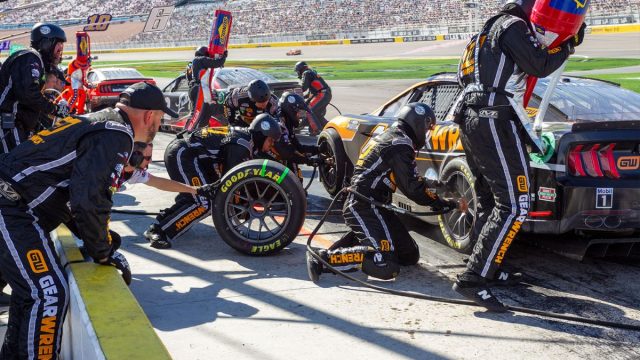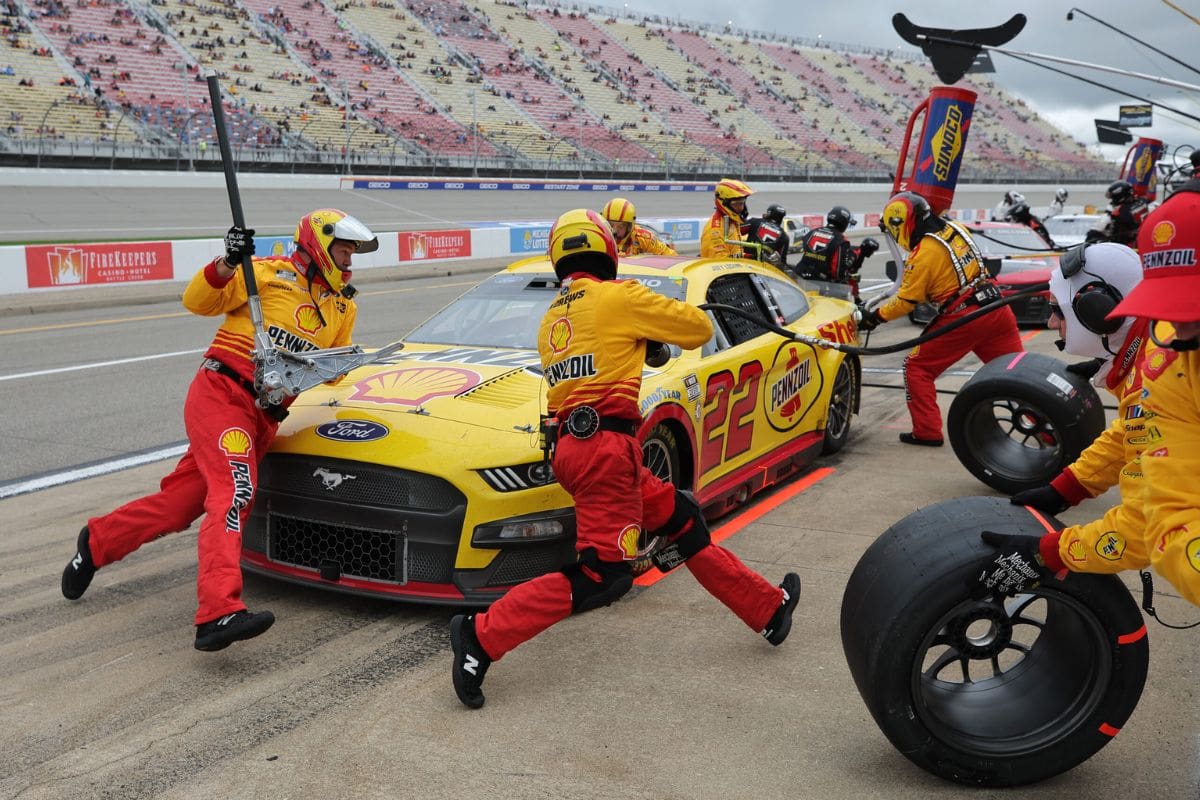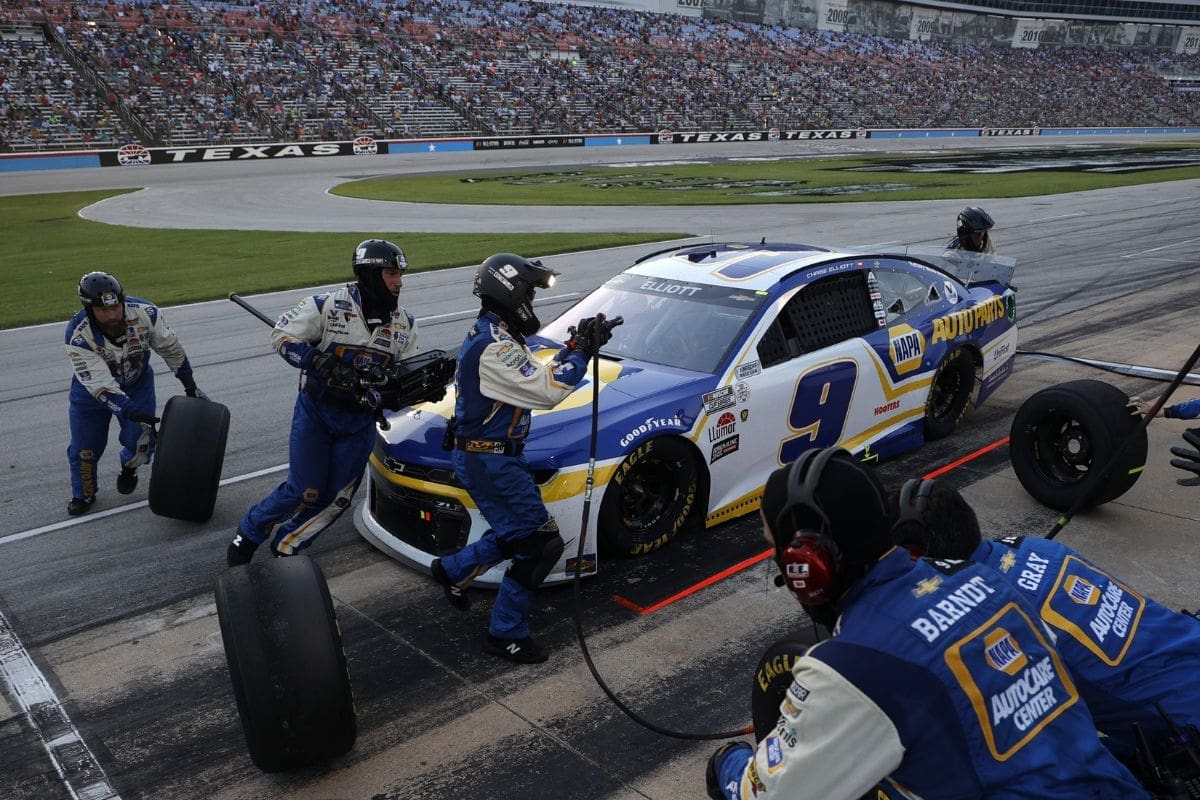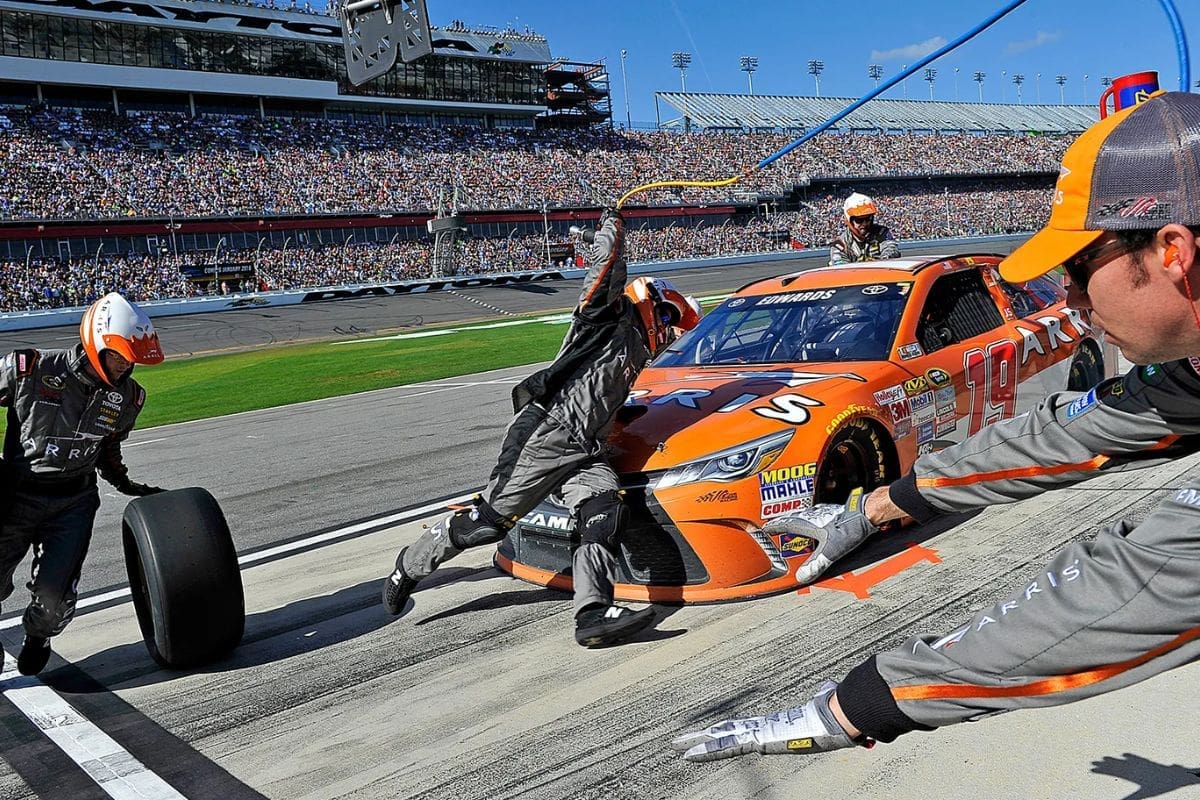Inside NASCAR’s Secret World of Pit Crews: In NASCAR, the roar of engines and the thrill of high-speed competition often steal the spotlight. Yet, behind the scenes, a dedicated team of individuals works tirelessly to ensure that every race runs smoothly and every pit stop is executed flawlessly. These unsung heroes, known as pit crew members, are the backbone of every successful team, combining athleticism, precision, and teamwork to support their drivers on race day. Yet, for these dedicated individuals, the opportunity to be part of a winning team and experience the thrill of victory outweighs the financial sacrifices they make.
Recruitment and Training
In NASCAR, success on the track requires more than just skilled drivers—it demands a well-oiled team working seamlessly behind the scenes. Pit crew members, often referred to as the unsung heroes of the racing world, play a pivotal role in ensuring their driver’s success on race day. Unlike drivers who often rise through the ranks of karting and lower-tier racing series, pit crew members often come from diverse athletic backgrounds.
Teams like Hendrick Motorsports employ unique recruitment strategies to identify and recruit talent from colleges and universities across the country. Their scouting efforts target former collegiate athletes, particularly those with backgrounds in sports like football and wrestling. These athletes possess the physical attributes and mental toughness necessary to thrive in the high-pressure environment of pit road.
Once identified, prospective pit crew members undergo rigorous training programs to hone their skills and prepare for the demands of NASCAR racing. These programs focus on developing strength, agility, and precision—the essential qualities required to perform tasks such as tire changes, fueling, and adjustments during pit stops. Training sessions often simulate real race conditions, allowing crew members to practice their roles in a controlled environment.
Transitioning from traditional team sports to the world of NASCAR presents its own set of challenges. While the fundamentals of teamwork and competition remain constant, the technical aspects of pit crew duties require a unique skill set. Pit crew development coaches like Keith Flynn play a crucial role in guiding athletes through this transition, providing mentorship and specialized training to help them succeed in their new roles.
Contracts and Compensation
While the spotlight may shine brightest on NASCAR’s top drivers, the contributions of pit crew members are no less vital to a team’s success. Behind every thrilling victory and heart-stopping pit stop lies a team of dedicated professionals working tirelessly to keep their driver competitive on the track. Despite their crucial role in the sport, pit crew members do not enjoy the same financial rewards as their counterparts behind the wheel.
Contracts between pit crew members and NASCAR teams vary in length and terms, with compensation based on factors such as experience, performance, and team success. Unlike the multi-million dollar contracts signed by top drivers, pit crew contracts reflect the specialized nature of their roles and the demands of the job. While drivers may enjoy lucrative endorsement deals and appearance fees, pit crew members rely primarily on their base salaries and performance-based bonuses.
The financial realities of NASCAR pit crew life are starkly different from those of top drivers like Kyle Busch, Denny Hamlin, and Kevin Harvick. While drivers command hefty salaries and endorsement deals, pit crew members earn a fraction of their income despite their integral role in a team’s success. However, for many pit crew members, the opportunity to be part of a winning team and experience the thrill of victory outweighs the financial sacrifices they make.
Performance-based incentives offer pit crew members the chance to earn additional income based on their team’s success on the track. These incentives can range from team-wide bonuses following significant victories to individual rewards for achieving specific goals during pit stops. While the financial rewards may pale in comparison to those enjoyed by drivers, the sense of camaraderie and accomplishment shared by pit crew members is priceless.
In NASCAR racing, pit crew members are the unsung heroes who keep their teams running smoothly both on and off the track. While their salaries may not rival those of top drivers, their dedication, skill, and teamwork are essential ingredients for success in one of the world’s most competitive sports.
Annual Salaries and Work Demands
For NASCAR pit crew members, the road to success is paved with dedication, hard work, and a relentless pursuit of excellence. While their counterparts behind the wheel may bask in the glory of victory, pit crew members toil behind the scenes, often overlooked but always essential to a team’s performance. Despite the demanding nature of their jobs, pit crew members are driven by a passion for competition and a shared commitment to achieving success on race day.
Annual salaries for pit crew members vary depending on factors such as experience, role within the team, and the success of their respective organizations. While entry-level positions may offer salaries on the lower end of the spectrum, experienced crew members and team leaders can command higher pay scales. On average, pit crew members earn between $30,000 and $100,000 annually, with an average salary of approximately $87,000.
In addition to their base salaries, pit crew members have the opportunity to earn bonuses based on their team’s performance throughout the season. These bonuses can be tied to various metrics, including race wins, top finishes, and successful pit stops. While the financial rewards may fluctuate from season to season, the sense of pride and accomplishment that comes from contributing to a winning team is priceless.
The demanding nature of NASCAR racing means that pit crew members must be prepared to work long hours and travel extensively throughout the season. Unlike drivers who enjoy the limelight and adulation of fans, pit crew members often labor in the shadows, quietly executing their duties with precision and professionalism. Their work ethic and dedication are the backbone of every successful team, ensuring that their drivers have the best possible chance of victory on race day.
Despite the challenges they face, pit crew members approach each race with a sense of purpose and determination, knowing that their contributions are essential to their team’s success. Whether changing tires, refueling, or making critical adjustments during pit stops, these unsung heroes are the embodiment of teamwork and camaraderie. As NASCAR continues to evolve, let us not forget the vital role played by pit crew members in shaping the sport’s rich and storied history.
Performance-Based Incentives
In NASCAR, where every second counts and the margin between victory and defeat is razor-thin, performance-based incentives offer an additional layer of motivation for pit crew members. These incentives, often tied to team success and individual performance, serve as a tangible reward for the dedication and hard work of pit crew members throughout the season.
Following a significant victory or top finish, pit crew members may be eligible for team-wide bonuses, providing a collective celebration of their success on the track. These bonuses serve not only as a financial reward but also as a testament to the teamwork and camaraderie that define NASCAR racing. For pit crew members, who often labor in the shadows, these moments of recognition are a source of pride and validation for their efforts.
In addition to team-wide bonuses, pit crew members may also have the opportunity to earn individual incentives based on their performance during pit stops. For example, Denny Hamlin reportedly awarded each member of his pit crew a $2,000 bonus after winning his second Daytona 500. Moreover, Hamlin offered an additional incentive of $200 per member for each spot gained during pit stops—a testament to the importance of precision and efficiency on pit road.
Beyond financial rewards, performance-based incentives serve as a powerful motivator for pit crew members, driving them to push themselves to new heights and strive for excellence on race day. Whether changing tires, refueling, or making critical adjustments, every action on pit road has the potential to impact the outcome of the race. By offering incentives tied to performance, NASCAR teams not only incentivize their pit crew members but also reinforce the importance of their role in the team’s success.
Performance-based incentives extend beyond race day, with pit crew members also having the opportunity to compete for additional rewards in events such as the Pit Crew Challenge ahead of the NASCAR All-Star Race. These competitions not only showcase the skills and abilities of pit crew members but also offer a chance for recognition and celebration of their talents.
News in Brief: Inside NASCAR’s Secret World of Pit Crews
In NASCAR, where every second counts and victory hangs in the balance, pit crew members are the unsung heroes who keep the wheels turning and the engines roaring. From recruitment and training to contracts and compensation, these dedicated individuals play a crucial role in the success of their teams, embodying the spirit of competition and teamwork that defines the sport.
In NASCAR, where success is measured in milliseconds, let us celebrate the unsung heroes of the racing world—pit crew members—who keep the sport running smoothly both on and off the track.
Our Reader’s Queries
Q. Who is the boss of the NASCAR pit crew?
A. In NASCAR, the Pit Boss, also known as the Crew Chief, serves as the primary strategist and leader of the pit crew. They play a pivotal role in making crucial decisions throughout the race, overseeing the team’s performance, and ensuring optimal performance of the car.
Q. What is the salary for pit crew NASCAR?
A. As of May 22, 2024, NASCAR pit crew members in the United States earn an average hourly wage of $21.28.
Q. How many people are on a NASCAR pit crew?
A. Similar to caddies at the Masters, NASCAR pit crew members have the opportunity to earn bonuses based on their driver’s performance. Following his second Daytona 500 win in 2019, Hamlin shared on an episode of the podcast “Pardon My Take” that he rewarded each member of his 20-person pit crew with $2,000 bonuses.
Q. Who runs the pit crew?
A. The crew chief takes charge of coordinating the pit crew’s actions, communicating with the driver, and simultaneously analyzing the televised race broadcast using flat-screen monitors strategically positioned throughout the pit box.
ALSO READ: Joe Gibbs Racing Pit Crew Challenge Victory in All-Star Weekend



